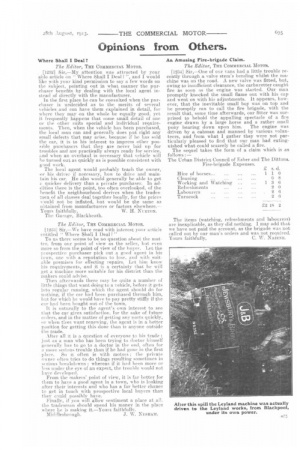Opinions from Others.
Page 19

If you've noticed an error in this article please click here to report it so we can fix it.
Where Shall I Deal?
The Editor, THE COMMERCIAL MOTOR.
[12321 Sir,—'My attention was attracted by your able article on " Where Shall I Deal ? ", and 1 would like with your kind permission to say a few words on the subject, pointing out in what manner the purchaser benefits by dealing with the local agent instead of directly with the manufacturer.
Ia the first place he can be consulted when. the purchaser is undecided as to the merits of several vehicles and can have them explained in detail, for where they may on the whole be equally good, yet it frequently happens that some small detail of one or the other suits special and individual requirements. Then, when the vehicle has been purchased, the local man can and generally does put right any small defects that may arise, because if he has sold the ear, it is to his interest to impress other possible purchasers that they are never laid up for troubles and are practically always ready for service, and when an overhaul is necessary that vehicle will he turned out as quickly as is possible consistent with good work.
The local agent would probably teach the owner, or his driver if necessary, how to drive and maintain his car. He also would generally he able to get r: quicker delivery than a private purchaser. In addition there is the point, too often overlooked, of the benefit the neighbourhood derives when the tradesmen of all classes deal together locally, for the prices youkl not be inflated, hut would be the same as obtained from manufacturers or factors elsewhere.- Yours faithfully, W. H. Nuirrox. The Garage, Blackheath.
The Editor, THE COMMERCIAL MOTOR.
[1233] Sir,—We have read with interest your article entitled " Where Shall I Deal? "
To us there seems to be no question about the mat ter, from our point of view as the seller, but even more so from the point of view of the buyer. Let the prospective purchaser pick out a good agent in his town, one with a reputation to lose, and with suitable premises for effecting repairs. Let him know his requirements, and it is a certainty that he will get a machine more suitable for his district than the makers could advise.
Then afterwards there may be quite a number of little things that want doing to a vehicle, before it gets into regular running, which the agent should do for nothing, if the car had been purchased through him, but for which he would have to pay pretty stiffly if the car had been bought out of the town.
It is naturally to the agent's own interest to see that the car gives satisfaction, for the sake of future orders, and in the matter of getting any nails quickly, or when tires want renewing, the agent is in a better position for getting this done than is anyone outside the trade.
After all it is a question of everyone to his trade : just as a man who has been trying to doctor himself generally has to go to a doctor in the end, often for a more serious trouble than if he had gone in the first place. So it. often is with motms ; the private owner often tries to do things resulting sometimes in scrious breakdowns ; whereas if it had been more or less under the eye of an expert, the trouble would not have developed.
From the makers' point of view, it is far better for them to have a good agent in a town, who is looking after their interests and who has a far better chance to get in tuna with prospective local buyers than they could possibly have. if you will allow sentiment a place at all. the tradesman should spend his money in the place where he is making it.—Yours faithfully.
Middlesbrough. J. W. NEsunr. An Amusing Fire-brigade Claim.
The Editor, THE COMMERCIAL MOTOR.
[1234] Sir,—One of our vans had a little trouble recently through a valve stern's bending whilst the machine was on the road. A new valve was fitted, but, owing to insufficient clearance, the carburetter caught fire as soon is the engine was started. Our man promptly knocked the small flame out with his cap and went on with his adjustments. It appears, however, that the inevitable small boy was on top andhe promptly ran to call the fire brigade, with the result that, some time afterwards, our fitter was surprised to behold the appalling spectacle of a fire engine drawn by a large horse and a rather small pony bearing down upon him. The engine was driven by a cabman and manned by various volunteers, and from what I gather they were not particularly pleased to find that our man had extinguished what could scaucely be called a fire.
The sequel takes the form of a claim which, is as follows:—
The items (watching, refreshments and labourers) are inexplicable, as they did nothing. 1 may add that we have not paid the account, as the brigade was not called out by our man's orders and was not required. Yours faithfully, C. W. NAIRNE.
























